from the Texas State Library and Archives Commission website
1932-1934
Judd Mortimer Lewis, Houston
1934-1936
Aline T. Michaelis, Austin
1936-1939
Grace Noll Crowell, Dallas
1939-1941
Lexie Dean Robertson, Rising Star
1941-1943
Nancy Richey Ranson, Dallas
1943-1945
Dollilee Davis Smith, Cleburne
1945-1947
David Riley Russell, Dallas
1947-1949
Aline B. Carter, San Antonio
1949-1951
Carlos Ashley, Llano
1951-1953
Arthur M. Sampley, Denton
1953-1955
Mildred Lindsey Raiborn, San Angelo
Dee Walker, Texas City, alternate
1955-1957
Pierre Bernard Hill, Hunt
1957-1959
Margaret Royalty Edwards, Waco
1959-1961
J. V. Chandler, Kingsville
Edna Coe Majors, Colorado City, alternate
Lorena Simon, Port Arthur
Marvin Davis Winsett, Dallas
Gwendolyn Bennett Pappas, Houston
Vassar Miller, Houston, alternate
1964-1965
Jenny Lind Porter, Austin
Edith Rayzor Canant, Texas City, alternate
Bessie Maas Rowe, Port Arthur
Grace Marie Scott, Abilene, alternate
William. E. Bard, Dallas
Bessie Maas Rowe, Port Arthur, alternate
Kathryn Henry Harris, Waco
Sybil Leonard Armes, El Paso, alternate
1969-1970
Anne B. Marely, Austin
Rose Davidson Speer, Brady, alternate
1970-1971
Robby K. Mitchell, McKinney
Faye Carr Adams, Dallas, alternate
1971-1972
Terry Fontenot, Port Arthur
Faye Carr Adams, Dallas, alternate
1972-1973
Mrs. Clark Gresham, Burkburnett
Marion McDaniel, Sidney, alternate
1973-1974
Violette Newton, Beaumont
Stella Woodall, San Antonio, alternate
1974-1975
Lila Todd O'Neil, Port Arthur
C. W. Miller, San Antonio, alternate
1975-1976
Ethel Osborn Hill, Port Arthur
Gene Shuford, Denton, alternate
1976-1977
Florice Stripling Jeffers, Burkburnett
Vera L. Eckert, San Angelo, alternate
1977-1978
Ruth Carruth, Vernon
Joy Gresham Hagstrom, Burkburnett, alternate
1978-1979
Patsy Stodghill, Dallas
Dorothy B. Elfstroman, Galveston, alternate
1979-1980
Dorothy B. Elfstroman, Galveston
Ruth Carruth, Vernon, alternate
1980-1981
Weems S. Dykes, McCamey
Mildred Crabtree Speer, Amarillo, alternate
1981-1982
none designated
1982-1983
William D. Barney, Fort Worth
Vassar Miller, Houston, alternate
1983-1984
none designated
1984-1985
none designated
1985-1986
none designated
1986-1987
none designated
1987-1988
Ruth E. Reuther, Wichita Falls
1988-1989
Vassar Miller, Houston
1989-1990
none designated
1990-1991
none designated
1991-1992
none designated
1992-1993
none designated
1993-1995
Mildred Baass, Victoria
1995-1996
none designated
1996-1997
none designated
1997-1998
none designated
1998-1999
none designated
James Hoggard, Wichita Falls
Walter McDonald, Lubbock
Jack Myers, Mesquite
Cleatus Rattan, Cisco
Alan Birkelbach
Red Steagall
Steven Fromholz, Kopperl
Larry D. Thomas, Houston
Paul Ruffin, Huntsville
Karla K. Morton, Denton
David M. Parsons, Conroe
Jan Seale, McAllen
Rosemary Catacalos, San Antonio
Dean Young, Austin

4.5.2015
Ambassadors for Poetry:
Interviews with three Texas Poets Laureate
by Marilyn Westfall
IN RECOGNITION OF NATIONAL POETRY MONTH 2015, Lone Star Literary Life contacted three Texas Poets Laureate about their experiences while serving as state poets. Larry D. Thomas was awarded the position in 2008; Dave Parsons in 2011; and Jan Seale in 2012.
The title of Texas Poet Laureate was authorized by the legislature in 1933 in order to recognize a citizen of Texas for outstanding literary accomplishment. Judd Mortimer Lewis of Houston was the first of fifty-one writers named as poet laureate. In ancient tradition, a poet awarded the title of laureate was crowned with a wreath woven from laurel leaves. In the current era, countries, states, and many municipalities confer the title on notable individuals to honor their talent, publications, and devotion to teaching the art form. Charles Wright, for example, winner of both the Pulitzer Prize and National Book Award, serves as the 2014-15 United States Poet Laureate.
In 2003, the Texas Commission on the Arts (TCA) was tasked with seeking nominations for poet laureate. The commission pores over the nominations and a State Artists’ Committee selects the winner. Presently, the announcement of the fifty-second state poet is slated for April 2015. Until then, Professor Dean Young, who holds the William Livingston Chair of Poetry at the University of Texas, will continue as the state literary representative.
The honorary position of Texas Poet Laureate comes with no expectations to make appearances, perform readings, conduct workshops, or commit time and energy to other kinds of public functions. Nor is any financial stipend awarded by the state.
Yet Seale, Parsons, and Thomas served with purpose and generosity. Each traveled widely throughout Texas, logging tens of thousands of miles, and often covering their expenses out of pocket. Dave Parsons, for example, was well compensated for some events (he averaged four to eight per month), but also made many “pro bono” appearances. In all, he estimated compiling about $25,000 worth of travel expenses. Jan Seale visited twenty-three schools (K-12 and college), and gave readings or made presentations on more than fifty occasions for civic groups, museums, and libraries. Larry Thomas was fortunate to receive a grant and used it largely to fund travel to schools where he worked one-on-one with young poets and critiqued poetry for free. Thomas noted that many Texas schools “had no funds allocated for such activities.”
The generosity of these poets was exceeded only by the sense of fulfillment they felt, in serving and meeting with fellow Texans. Jan Seale said, “I really enjoyed all the social contact with people who came out to hear me and talk with me.” Receiving the honor both “refreshed” her and “gave new meaning” to a lifetime dedicated to writing. Larry Thomas was likewise grateful for public support. “What amazed me most,” Thomas said, “was the enormous respect people of the community at large had for the poet laureate position.” Dave Parsons reflected on his year as poet laureate: “I think there is a humility and feeling of good will that is engendered to all that are fortunate to be chosen.”
Nominations for poet laureate can be made by any Texas citizen willing to fill out a form available at the TCA web site. Poets are permitted to self-nominate! The selection process is rigorous, however, and those awarded the title have demonstrated “years of excellence and dedicated commitment to the arts in Texas,” according to information provided by the TCA.
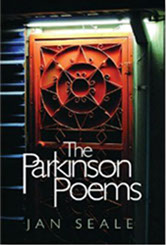 The poets interviewed for this article are widely published and award-winning. Thomas, for instance, learned recently that his chapbook The Goatherd received the 2015 Western Heritage Award for poetry. It is one of the top awards in the nation for creative work that celebrates the historical or contemporary American West. Just as I contacted Jan Seale, she learned that her book The Parkinson Poems was a finalist for the 2014 poetry award from The Texas Institute of Letters. Dave Parsons keeps a hectic pace with writing and other literary activities. The day before I emailed interview questions to him, he had just okayed the galley for his new book, Reaching for Longer Water.
The poets interviewed for this article are widely published and award-winning. Thomas, for instance, learned recently that his chapbook The Goatherd received the 2015 Western Heritage Award for poetry. It is one of the top awards in the nation for creative work that celebrates the historical or contemporary American West. Just as I contacted Jan Seale, she learned that her book The Parkinson Poems was a finalist for the 2014 poetry award from The Texas Institute of Letters. Dave Parsons keeps a hectic pace with writing and other literary activities. The day before I emailed interview questions to him, he had just okayed the galley for his new book, Reaching for Longer Water.
These poets are busy, and I am grateful to have had the chance to correspond with and learn from them. Their full interviews, conducted via email, have been edited with the lightest touch, for formatting. Dave Parsons said about being nominated for poet laureate: “I was absolutely floored by the number and quality of the poets in Texas.” Parsons, Seale, and Thomas are among the best—not only in Texas, but in the United States.
An Interview with Larry D. Thomas
2008 Texas Poet Laureate
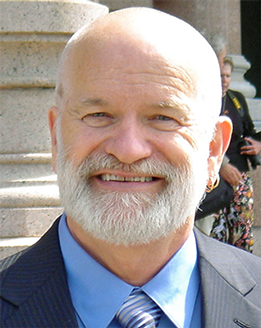
Visit his web site at www.larrydthomas.com.
Larry Thomas, thanks for agreeing to be interviewed by Lone Star Literary Life about your appointment as 2008 Texas Poet Laureate. I’m curious about your initial reaction to receiving word of your appointment. Were you aware that you’d been nominated?
I was quite honestly extremely surprised. I had previously assumed that the selection process was much more “political” certainly than it proved to be in my individual case. I had never even thought about being appointed to the position until I learned that I was being nominated in 2006 for one of the 2007/2008 Texas Poet Laureate positions.
I wasn’t aware that I had been nominated until I received, from a former Texas Poet Laureate who was nominating me for the position, a request for my home phone number which was needed for the nomination form. I subsequently learned that a number of other individuals had kindly nominated me.
How extensive was your publication record, prior to your appointment? Was there a particular collection or group of poems, in your estimation, that was decidedly influential in your being nominated for the poet laureate position?
I had published seven collections of poetry prior to my appointment, each by a respectable national literary publisher. Three of the collections received significant literary awards: Amazing Grace (Texas Review Press 2001) the 2001 Texas Review Poetry Prize, the 2003 Western Heritage Award from the National Cowboy & Western Heritage Museum, and a 2002 Spur Award Finalist citation from Western Writers of America; The Woodlanders (Pecan Grove Press 2002) a finalist in the Pecan Grove Press National Chapbook Competition and a Violet Crown Book Awards Special Citation from the Writers’ League of Texas; Where Skulls Speak Wind (Texas Review Press 2004) the 2004 Texas Review Poetry Prize, 2004 Violet Crown Award (Writers’ League of Texas), and a 2005 Spur Award Finalist citation from Western Writers of America; and Stark Beauty (Timberline Press, 2005) a 2007 Poets’ Prize nomination (Nicholas Roerich Museum) and 2006 Spur Award Finalist citation from Western Writers of America. Additionally, I had been privileged to publish a number of poems in dozens of distinguished national literary journals, including the Southwest Review, Small Pond Magazine of Literature, Puerto del Sol, Poet Lore, Writers’ Forum, Chattahoochee Review, Louisiana Literature, Journal of the American Medical Association, American Indian Culture & Research Journal, and elsewhere.
The only thing which might (and I say “might” because I am only conjecturing) have been influential in my being nominated was the relatively large number of my published poems which were set in Texas. My first five published collections were resonant with a strong sense of place, from far West Texas, where I was born and raised, to Southeast Texas and the Gulf Coast, where I lived from the age of twenty to the age of sixty-four.
There are no “obligations” that come with the appointment, but you were very active in working with the public during your year’s tenure. Could you summarize your activities? What work was most fulfilling?
What was most fulfilling was the opportunity I enjoyed to present my poetry to students, from elementary schools to colleges, throughout the entire state. I was privileged to receive a $2,000 grant from the Ron Stone Foundation (Houston) for the enhancement and study of Texas history. I used the entire grant to cover travel/lodging expenses for my appearances at schools throughout the state which had no funds allocated for such activities.
Another fulfilling endeavor was the opportunity I had to work one-on-one with young poets of seriousness, sharing with them my poetry writing practices and critiquing their own work. I did this primarily in the Greater Houston metropolitan area and provided my services free of charge.
What impact has the appointment had on your career?
My appointment as Texas Poet Laureate had a major impact on my public profile. Poets of seriousness, generally speaking, are known within the poetry arena but hardly at all by the general public. Prior to my appointment, my poetry was familiar to a number of the publishers and editors of distinguished literary journals, especially in Texas, and I enjoyed the distinction of being a regular contributor of poetry to a number of these journals, including the Texas Review, Southwestern American Literature, descant: fort worth’s journal of poetry and fiction, Borderlands: Texas Poetry Review, REAL: Regarding Arts & Letters, and the Concho River Review. After my appointment, however, I immediately started receiving requests for interviews by major media organizations and requests for readings from several colleges/universities and community organizations such as Rotary Clubs, historical societies, poetry societies, etc. The invitations almost quadrupled in comparison with those I received prior to my appointment.
What amazed me most about my appointment was the enormous respect people of the community at large had for the poet laureate position. Even people who had not read much poetry since public school or college seemed to share this respect. It was most impressive.
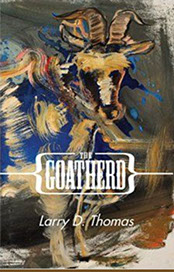 What are your current projects? Is 2015 proving to be a busy and rewarding year for you?
What are your current projects? Is 2015 proving to be a busy and rewarding year for you?
For the past several months, I have been composing poetry chapbooks (short collections of poems) inspired by the Big Bend/Terlingua area of far West Texas, both historically speaking and contemporary. My collection, The Red, Candlelit Darkness (El Grito del Lobo Press, 2011), about the Mexican mercury/quicksilver miners of the Chisos Mining Company in the early 1900s, quickly sold out its first printing and received a Spur Award Finalist citation from Western Writers of America. The Goatherd (Mouthfeel Press, 2014), inspired by the Mexican pioneer goatherd/farmer Gilberto Luna, who resided in the Big Bend area in the late 1800s and early 1900s, was just awarded the 2015 Western Heritage Award (literary/poetry book category). Two other very recent collections, The Innkeeper and Los Días de Los Muertos, set in the area are currently in press at Mouthfeel Press and Right Hand Pointing, respectively. And I am currently working on another chapbook, El Padre. Hence, 2015 is certainly proving to be a busy and rewarding year for my work.
An Interview with Jan Seale
2012 Texas Poet Laureate
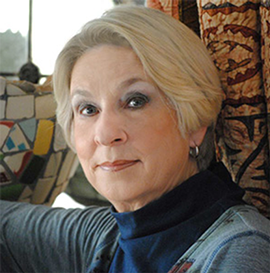
Visit her web site at www.janseale.com.
(Author’s note: When I first contacted Jan Seale for an interview, she reminded me that she’d written an article about the Texas Poets Laureate that had appeared in the Spring 2014 edition of Concho River Review. I found my copy of the journal and reread her “Tripping the Light Fantastic: A Look at Texas Poets Laureate.” I then asked her a question based on a personal anecdote she’d shared in that article.)
Jan, I just finished rereading your article that appeared in Concho River Review, regarding the poets laureate. It was so lively and engaging. You know, having given your article a second look, I came away with a question. Late in the article, you described a student expressing fears that he wouldn't "understand your poems." During your experience as poet laureate, did you find the public receptive to your poetry? What insights did you gain about the manner in which the general public relates to poetry?
I spoke to many different types of audiences—youth, college students, and town citizens. They were generally quite welcoming of my work, with a variety of responses, all the way from one student saying, "Just wait until I tell my mother what she missed" to another saying, "I like your snarky poems the best."
The general public wants accessible poetry, especially if they're going to listen to it for the first and only time. For this reason, I tried to be quite careful in choosing which work I would present to them. No wool-gathering, bad dreams, or stream of consciousness! In some college classrooms, I could present complex poems where there was time to examine them and get feedback.
Would you mind describing your initial reaction to receiving word of your 2012 appointment as Texas Poet Laureate? Did you know that you'd been nominated?
When the person from the Texas Commission on the Arts called to tell me about my appointment, it was a beautiful April morning and I was with my husband in his study. I was thrilled, so much so that I had to sit down! Reflecting back on that time, I couldn't possibly know what all the post entailed, both divine and arduous. Yes, I knew I'd been nominated. The finalists are all notified and asked if they will serve if chosen.
In regards to your year's appointment: How often were you called upon to read or otherwise appear in public functions as Texas Poet Laureate? The appointment carries no "obligations," yet I'm sure you felt a desire to promote poetry and the arts. Did you find any time to write? How did your year divide along lines of personal and public fulfillment?
Actually, my public service started when both Dave Parsons and I were announced. His year started immediately and mine was the second year of that biennium but when the news was out, I began to get invitations immediately. From that time until April of 2013, when my year ended, I had traveled 26,000 miles in Texas and spoken to 5,000 Texans. My work included 10 college visits, 13 K-12 school visits, 14 readings/talks to associations, 8 club appearances, 7 festival appearances, 6 library and museum programs, 3 school in-service presentations, 5 bookstore and cafe signings, 4 literary contests judged, 5 various other venues, and 4 books published.
What impact has the appointment had on your career?
No doubt that it greatly aided my life as a poet and writer, as well as refreshed my spirit and gave new meaning to my lifetime of writing. Publishers were receptive to my submissions and more folks bought my books. Personally, I became much stronger as a public speaker, and best of all, I really enjoyed all the social contact with people who came out to hear me and talk with me.
Tell me something about your plans for 2015. Do you have any books slated for publication? Are you working on a new collection?
I hope to finish up a book of essays in 2015. I'm about halfway through right now. A new book, just out for a couple of months, is Nature, Nurture, Neither: A Family's Journey in Creativity. It's a departure from poetry—as are several other books. It's about my late husband's* and my lives as artists and those of our three artist sons.
*Jan’s husband, Carl Seale, a conductor, composer, teacher, and father lost his twenty-year battle with Parkinson’s disease in September 2014 at age seventy-eight. He said of his life and career: “I have been lucky in that my job has also been my art.”
An Interview with Dave Parsons
2011 Texas Poet Laureate
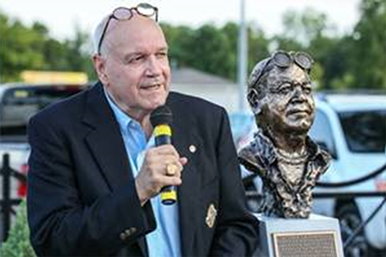
Visit his web site at www.daveparsonspoetry.com.
Dave Parsons, I’m grateful for your time. Tell me about your first reaction to being named the Texas Poet Laureate. If I remember correctly, you’d been nominated for a few years. It must have been wonderful to enjoy such wide support by fellow writers.
Yes, I’d been a finalist previously, and I confess that I felt that being selected as a finalist was, not only the most I could expect, but truly the ultimate for me. This is because the Texas Commission for the Arts selects the finalists, and the winners are chosen by a committee selected by the governor, lieutenant governor, and speaker of the House, who are, for the most part, patrons of the arts—not literary professionals. So, being a finalist was very humbling. After being designated the poet laureate and then traveling all over the state to libraries, schools, and poetry venues, I was absolutely floored by the number and quality of the poets in Texas. Being selected as the poet laureate is like winning the lottery. I’m more humbled than proud…and that is the gospel.
The poet laureate title comes with no obligations to be a “public servant.” And there is no stipend for travel or housing. How many times were you invited to read or contribute to educational events? How were you able to afford travel? What voluntary work was most fulfilling?
I averaged four to eight events monthly, as poet laureate. I did receive generous stipends for many events. At other times, I wasn’t fully reimbursed for costs. Frequently, I did pro bono events. I felt an obligation to be the Texas ambassador for poetry in 2011. By year’s end I’d accumulated $25,000 in travel expenses. The IRS audited me, and I found myself in a fight that took over a year to resolve. At one point, the IRS claimed that my poetry trips were my “hobby,” not a business…very frustrating!
Though I’m no longer the Texas Poet Laureate, I feel a sense of responsibility that comes with the title. Karla Morton, who held the title in 2010, brought the facts home to me about the lifelong effects of being named poet laureate. I’d given an interview to The Houston Chronicle just after I received notification of my selection, but before I’d been inducted, in Austin, as the official poet laureate—a no-no. I felt bad when the news “hit the streets,” and apologized to Karla. She told me, “Don’t worry about it.” We would always be the 2010 and 2011 Texas Poets Laureate. Karla is a terrific person! She told me about visiting the poet laureate Violette Newton at a nursing home. On the door to Violette’s room was the notice: “1973 Texas Poet Laureate.”
I feel a real kinship to Karla and all the past poets laureate. The group is small and rare. I think there is a humility and feeling of good will that is engendered to all who are fortunate to be chosen. When I shared the spotlight with Jan Seale at the state capitol, it began a relationship that made me feel that we were brother and sister. As poet laureate, you can feel like all poets and aspiring poets are your brothers and sisters.
How many chapbooks or collections of poetry had you published prior to your appointment? Are there online journals where readers can easily access your poems?
I’d published three books, but only two were respectable offerings: Editing Sky and Color of Mourning. I did have my third book, Feathering Deep, on the way to press. There isn’t one central place online to find my poems. However, if you Google me, you will find scattered sites. I have selected poems on my web site www.daveparsonspoetry.com. Mostly, these are award winners or anthologized poems.
During your tenure as poet laureate, did you compose any “civic” poetry, perhaps by request or commission? What insights did you gain into public support for poetry and the arts in general?
Yes, I had several requests to write poems. For example, I was asked to compose a poem for the opening of the Lone Star Monument and Historical Flag Park in Conroe. It’s a terrific little park with a statue of a Texian soldier, by sculptor Craig Campobella, which is surrounded by the 13 battle flags of the Texas Revolution. I read three books to prepare to write the poem. It was a profound learning experience. I also was given a stipend to pen a poem for an event on the subject of “Peace.” I was truly surprised to be asked on maybe three occasions to read poems at funerals of people I didn’t know. I agreed to all the readings, and was happy I did so.
As to support for poetry among the general population: Many view poetry as something strange and removed from their everyday lives. I am reminded of W. C. Williams’ lines from his poem “Asphodel”: “It is difficult to get the news from poems / yet men die miserably every day / for lack / of what is found there.” I will say that the community of poets is not as isolated with the emergence of the Internet.
What impact has the appointment had on your career?
Monumental. Before I received the honor, I was viewed as a teacher who wrote poetry. After being named poet laureate, I was thought of, first, as a poet who happened to teach. I think all poets wish to be taken seriously as artists. And while I still receive rejections by journals, I find I have more opportunities than I can take advantage of. It takes me a long time to write a poem. I may work on a poem for six months to a year before I can send it out. I remember that one of my mentors at the University of Houston, Robert Pinsky, said, “We all publish too soon.” I have taken his advice to heart.
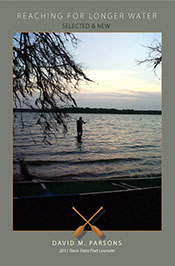 What are your plans for 2015? Are you at work on a new book? What appearances are forthcoming?
What are your plans for 2015? Are you at work on a new book? What appearances are forthcoming?
Just yesterday, I okayed the galley for my new book, Reaching for Longer Water. It’s slated for release in April, but is available for pre-purchase on Amazon now and also available at the Texas A&M University Press Consortium. The book is a very extensive collection of new and selected poems. I’m also nearly finished with co-editing an anthology with my good friend Wendy Barker: Far Out: Poems of the Sixties. Wings Press hopes to launch the book at the Los Angeles AWP Conference next year. The project has been a true joy! Wendy and I have been working on it for over three years, and I’ve enjoyed every minute. Finding sublime poems in my inbox every week from poets all over the world, who are telling their personal ’60s stories in verse…wow…what a “trip,” to use the vernacular. Ha! Inspired by the anthology, I’m working on a memoir about my coming of age in the 1960s in Austin. I also just finished serving as one of the final judges, along with Robert Pinsky, Patricia Smith, Mary Szybist, and Roberto Tejada, for the Museum of Fine Arts, Houston “Artlines” competition. Needless to say, I’m a lot busier than I thought I would be at my age.
* * * * *

